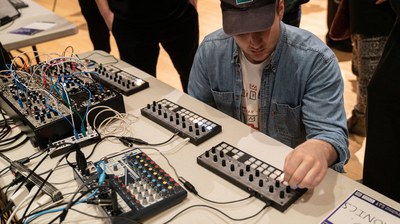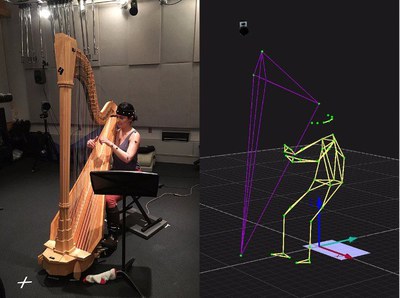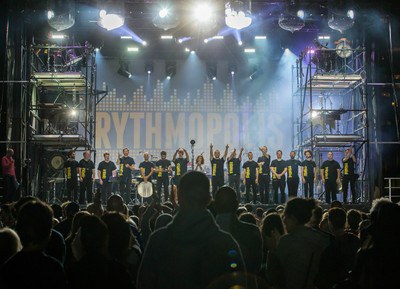CIRMMT's research is structured into four research axes (RAs) which encompass the major areas of exploration in musical science and technology: RA1 – Instruments, devices and systems; RA2 – Music information research; RA3 – Perception, cognition and movement; RA4 – Expanded musical practice. This integrated structure allows the coverage of a plethora of interconnected research questions that have the potential to shape the ways in which music will be composed, performed and experienced in the 21st century. One strength of CIRMMT's research axes stands in its bottom-up approach which allows the research and artistic creation to evolve according to the current challenges and new membership.
Research Axis 1: Instruments, devices & systems

This theme focuses on the development of engineering and mathematical tools for the study of sound and music, encompassing the study of instrument and room acoustics, digital signal processing, digital musical instruments, and devices, as well as software development for interactive music and computer-aided composition. Research involves areas such as computational acoustic modeling, virtual acoustics, immersive systems, intelligent sensors and sensor fusion adaptive instruments/interfaces and hearing aid systems, as well as on the historical, cultural and philosophical study of sound technology. The study of instrument acoustics and the development of tools for interactive performances can pave the way for collaborations with Québec and Canadian industries.
Co-leaders: Richard King (McGill University) & Olivier Robin (U. de Sherbrooke)
Student Coordinators: Raphaël Jeanvoine (U. de Sherbrooke) & Ying-Ying Zhang (McGill University)
Past RA1 leaders and student coordinators
Research Axis 2: Music information research

This theme focuses on computer applications for music information research, including digital music libraries, optical music recognition, computer-aided analysis of large amounts of music, and techniques for analyzing and identifying audio files. Research involves the development of software for music theory, musicology, crowd-sourcing and community involvement, leading to new approaches in the aesthetic and cultural analysis of music. Digital archiving and retrieval of musical materials (scores, recordings, graphics, texts) will continue to influence the future of music scholarship and music distribution.
Co-Leaders: Audrey Laplante (Université de Montréal) & Cory Mckay (Marianopolis College)
Student Coordinators: Negar Imani (McGill University) & Adelaide Tracey (Université de Montréal)
Past RA2 leaders and student coordinators
Research Axis 3: Cognition, perception & movement

This theme focuses on the scientific study of music, from the perspective of the performer to that of the audience and listeners, allowing the understanding of the action-perception loop to ways in which audiences engage and appreciate live music. Research involves the study of areas such as emotional response, motor skills and control, embodiment and movement synchronization, including their implications on music pedagogy, prevention of musician’s injuries and on the cultural study of music. Projects focusing on the analysis of musical performance allow for a better understanding of its highly demanding physical and cognitive aspects, with potential implications for millions of musicians around the globe. Research in music perception allows a deeper understanding of the musical experience across auditory and visual modalities as well as audiences' affective response to music in natural settings.
Co-leaders: Alexandre Lehmann (McGill University) & Caroline Traube (Université de Montréal)
Student Coordinators: Leïla Barbedette (Université de Montréal) & Linglan Zhu (McGill)
Past RA3 leaders and student coordinators
Research Axis 4: Expanded musical practice

This theme encompasses the artistic branch of CIRMMT's activities (research-creation) and seeks to apply scientific knowledge and technological development to expand musical practice in performance and composition. The Centre's artistic activities take CIRMMT's research all the way to the concert stage. Research topics include sound spatialization, the creation and performance of new works involving an increasing number of technological devices, the documentation and preservation of the creative processes in the context of music with electronics, as well as the evaluation of the impact of new technology on performance practice.
Co-leaders: Martha de Francisco (McGill) & Dominic Thibault (Université de Montréal)
Student Coordinators: Jaeyoung Chong (McGill) & Gaël Moriceau (Université de Montréal)

